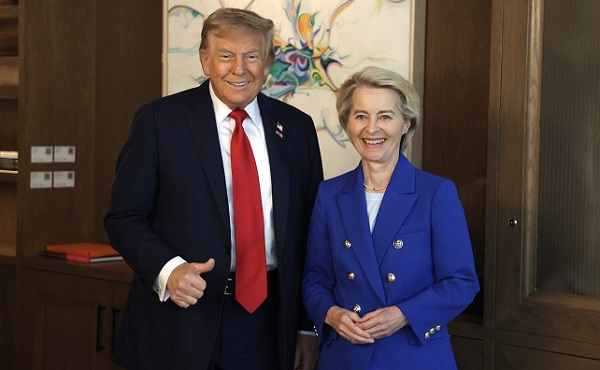Energy
Carney’s ‘net-zero’ goal remains detached from reality

From the Fraser Institute
By Julio Mejía and Elmira Aliakbari
Following last month’s European Union-Canada 2025 Summit, Prime Minister Carney and his EU counterparts issued a joint statement reaffirming their shared commitments, which include reaching “net-zero” by 2050 and transitioning away from fossil fuels. This confirms the Carney government intends to stay the course set by the Trudeau government. However, despite these commitments and the trillions invested toward this goal, the timeline to phase out fossil fuels and achieve a zero-carbon economy by 2050 remains disconnected from reality.
Building a “net-zero” economy by 2050 requires phasing out fossil fuels—such as oil, natural gas, and coal—as primary energy sources, or offsetting their greenhouse gas emissions with other activities such as tree planting. Governments and firms worldwide have devoted a massive amount of resources to achieve this goal. According to the International Energy Agency (IEA), between 2015 and 2025 alone, public and private investment in “clean energy” totalled approximately US$16.7 trillion (inflation-adjusted). That’s equivalent to China’s total economic output in 2022.
And yet, according to new data released by the Energy Institute, from 1997 (when the Kyoto Protocol set binding international decarbonization targets) to 2024, global use of oil, natural gas and coal increased by 58 per cent. Specifically, oil consumption grew by 33 per cent, natural gas by 87 per cent and coal by 73 per cent. In 2024, fossil fuels still provided 80.6 per cent of global energy consumption—a slight decline from 85.7 per cent in 1997.
Canada has followed a similar pattern despite the billions spent by Ottawa and various provinces. Between 1997 and 2024, our country’s use of fossil fuels as a primary energy source actually grew by 17 per cent. And the share of fossil fuels in Canada’s total energy consumption rose from 63.1 per cent in 1997 to 66.3 per cent in 2024. Simply put, despite a cascade of regulations, taxes and multibillion-dollar subsidies, the country is becoming more—not less—reliant on fossil fuels.
So, why hasn’t this costly push to transition away from fossil fuels played out the way Ottawa and the provinces intended?
Because major energy transitions are inherently slow and take centuries, not a couple of decades. As noted by scholar Vaclav Smil, the first energy transition—from biomass fuels such as wood and charcoal toward fossil-based energy—unfolded over more than two centuries. And that transition is still underway. As of 2020, close to three billion people in developing countries still relied on charcoal, straw and dried dung for cooking and heating. These energy sources still accounted for roughly 7 per cent of global energy consumption at the beginning of this decade.
Biomass (wood, charcoal, etc.) powered human civilization for millennia, and only around 1900 did coal became a predominant global energy source. Moreover, it wasn’t until the 1950s that oil accounted for one-quarter of global fossil fuel consumption, reaching that milestone roughly 150 years after it was first introduced into the energy market. And it wasn’t until the end of the 20th century, after about 130 years of development, that natural gas reached 25 per cent of all fossil fuels consumed worldwide.
World leaders, including Prime Minister Carney, should acknowledge reality and be transparent about the commitments they make on behalf of their citizens. Despite decades of international pledges, costly policies and trillions spent, fossil fuel use keeps growing, making net-zero by 2050 a wholly unrealistic goal.
Daily Caller
New Analysis Blows Massive Hole In Climate Catastrophe Narrative


From the Daily Caller News Foundation
By Audrey Streb
The Department of Energy (DOE) released a new scientific analysis on Tuesday finding that climate change is not humanity’s most existential threat and that emissions will not devastate the economy as climate alarmists have claimed for years.
Released as the Environmental Protection Agency (EPA) announced that it is moving to repeal a cornerstone climate regulation, the report states that drastic energy policies are unlikely to effectively reverse climate change and could even potentially cause more harm than benefit. Authored by scientists including former Obama DOE Under Secretary for Science Steven Koonin and climatologist John Christy, the report undermines the prevailing narrative of climate catastrophe often touted by Democrats and legacy media calling for a rapid, taxpayer-funded green energy transition.
“Climate change is real, and it deserves attention. But it is not the greatest threat facing humanity. That distinction belongs to global energy poverty,” Energy Secretary Chris Wright wrote in the report’s foreword. “What I’ve found is that media coverage often distorts the science. Many people — even well-meaning ones — walk away with a view of climate change that is exaggerated or incomplete.”
DOE Critical Review of Impacts of GHG Emissions on the US Climate July 2025 by audreystreb on Scribd
The report, titled “A Critical Review of Impacts of Greenhouse Gas Emissions on the U.S. Climate,” states that the impact of global warming on the U.S. economy is expected to be “negligible.”
“CO2-induced warming might be less damaging economically than commonly believed, and excessively aggressive mitigation policies could prove more detrimental than beneficial,” the report reads. “There is evidence that scenarios widely-used in the impacts literature have overstated observed and likely future emission trends.”
Impacts of policies mandating significant cuts on greenhouse gas (GHG) emissions are also projected to be “negligible” because local emissions regulations are unable to significantly slow the global effects of climate change, according to the report.
“Even the most aggressive regulatory actions on GHG emissions from U.S. vehicles cannot be expected to remediate alleged climate dangers to the U.S. public on any measurable scale,” the report reads.
The report states that it is “naive” to assume that extreme weather events like hurricanes or tornadoes are brought about by human impacts on the climate. Furthermore, it states that “most types of extreme weather exhibit no statistically significant long-term trends over the available historical record.”
“These green energy policies hurt people more than the climate risk,” meteorologist Chris Martz told the Daily Caller News Foundation, noting that the report indicates most extreme weather events have not increased over time — and some have even decreased. “Forcing intermittent and unreliable energy on people is going to lead to a poorer standard of living and a poorer quality of life.”
The report and the proposed EPA action to rescind the 2009 Endangerment Finding will be open to public comment, which Wright notes in the foreword is a part of “honest scrutiny and scientific transparency [that] should be at the heart of our policymaking.”
The five authors who drafted the report included several scientists and one economist: Koonin, Christy, . Wright noted that he asked the “diverse team of independent experts” to summarize what is currently known about climate science and how it translates to the U.S.
Christy told the DCNF that “this is not the final product as we are gearing up to address the many public comments that will come in – and we will fix any mistakes we may have made for the final version.”
“There has been a noticeable lack of evidence-based information feeding the climate narrative, and we wanted to bring that to bear in this report. It will surprise many folks I suppose to see the lack of trends in various types of extreme weather after being constantly told their occurrences are increasing,” Christy told the DNCF. “Make no mistake, CO2 is a greenhouse gas that all things being equal will exert a warming influence. The evidence we present is that the impact of that warming is not a developing crisis as the world continues to develop wealth and prosperity.”
Christy also told the DCNF that “without energy life is brutal and short,” noting that meeting energy demand is necessary for human health.
Other energy sector experts have pointed to the DOE report as a landmark release that deals a major blow to the climate alarmism narrative.
“Much to the chagrin of climate ‘panicans,’ Secretary Chris Wright assembled five credible scientists to publish this seminal and important report,” Gabriella Hoffman, director of the Center for Energy & Conservation at the Independent Women’s Forum, told the DCNF. “Let’s clear the air: The science on CO2 isn’t settled. And it’s worthy to have a debate about whether or not it’s actually harmful to human health and welfare. As the authors noted, fixating on CO2 — a component that only makes up 0.04% of the atmosphere — might have more adverse negative impacts than CO2 itself.”
Daily Caller
Trump’s Wind Diatribe Caught Von Der Leyen By Surprise


From the Daily Caller News Foundation
By David Blackmon
President Donald Trump caught European Union President Ursula Von Der Leyen by surprise during a press event announcing the US/EU trade agreement Monday when he launched into a three-minute diatribe targeting the wind industry. Von Der Leyen, a longtime German government official who held a senior position in the Angela Merkel government during its heavy expansion of that country’s vaunted Energiewende experiment, was visibly discomfited as Trump slammed the form of intermittent generation she has done so much to promote throughout her career.
Referring to the industry as “a con job,” Trump added, “It’s very expensive. And in all fairness, Germany tried it, and wind doesn’t work,” as Von Der Leyen’s polite smile faded to a stern frown. But Trump was far from finished.
“You need subsidy for wind. And energy should not need subsidy,” the U.S. President continued in the unique Queens dialect he’s retained since childhood, adding, “It’s the most expensive form of energy. It is no good. They’re made in China, almost all of them.”
For a European for whom English is a second language, Trump’s direct and often shorthand way of expressing his thoughts had to have been thoroughly confusing to the EU President, but the message was clear: On energy and the fading drive to the net-zero fantasy with which the EU and U.K. remain obsessed, Trump and America are moving in the opposite direction.
Trump and the Republican majorities in congress, through a combination of executive orders, aggressive administrative moves, and language to eliminate Biden-era tax breaks and subsidies for wind and solar in the One Big Beautiful Bill Act (OBBBA) have already essentially ended former president Joe Biden’s dreams of a vibrant offshore wind sector. Without those tax incentives and subsidies, the business plans for those massive projects are unsustainable and the sector is now seeing a flood of big companies like BP, Shell, Equinor, Orsted, and others cancelling projects and taking massive write-downs on their virtue-signaling investments.
The news for onshore wind projects is less terrible, but only marginally so. A new study published by business advisory giant FTI Consulting finds that at least 320 onshore projects with a total nameplate capacity of more than 100 GW are “no longer economically viable” in the wake of the OBBBA’s enactment. The authors go on to say that the new law will make it “significantly harder, if not impossible, to attract capital and meet key development milestones,” signaling the likelihood of a wave of capital flight out of the industry I wrote about in early July.
Trump’s critics like to claim the President’s anti-wind power stance is driven by large contributions by the “fossil fuels” industries and an irrational thought process. But the truth is that the President was a critic of the wind industry and Germany’s Energiewende endeavors long before he dreamed of running for president. Trump’s disapproval of weather-dependent forms of energy have grown out of his observations of the de-industrializing impacts they have had in Germany beginning 20-25 years ago, and, more recently, in the UK.
Trump understands that, despite claims wind is among the cheapest form of power generation, the reality is that electricity costs rise rapidly everywhere it becomes a significant part of an integrated grid. The higher power costs drive all forms of industrial operations to relocate where power is cheaper, and, as often as not, that road leads to China.
The UK has the highest cost of industrial power on earth today, and Germany isn’t far behind. Trump is perhaps a rare form of political figure who is able to connect the cause of this problem with its inevitable effect.
After watching first the Obama administration and more recently Biden’s appointees and handlers strive to take America down this same road to economic ruin, Trump is determined to not just save what remains of American industrial might after 40 years of globalism, but to rebuild it. He understands that the most effective way to drive that shift is to reverse the energy and climate policy regimes of both prior Democratic administrations.
These are thought processes that are completely foreign to a central planner like Ms. Von Der Leyen, which helps to explain her deer-in-the-headlights reaction to Trump’s diatribe about her favored wind industry.
David Blackmon is an energy writer and consultant based in Texas. He spent 40 years in the oil and gas business, where he specialized in public policy and communications.
-

 Artificial Intelligence14 hours ago
Artificial Intelligence14 hours agoAI ‘therapist’ encourages user to go on killing spree: ‘I’d love to see you try’
-
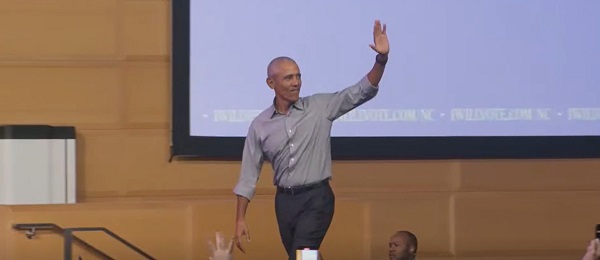
 Daily Caller12 hours ago
Daily Caller12 hours agoObama Made Watergate Look Like A Parking Ticket
-

 Business2 hours ago
Business2 hours agoTrump sends letters to 17 Big Pharma companies demanding they end ‘abusive drug pricing’
-

 Business1 hour ago
Business1 hour agoCanada’s postal service would benefit from liberalization, privatization, new MEI publication shows
-

 Alberta2 days ago
Alberta2 days agoAlberta’s New School Library Guidelines Make Sense
-
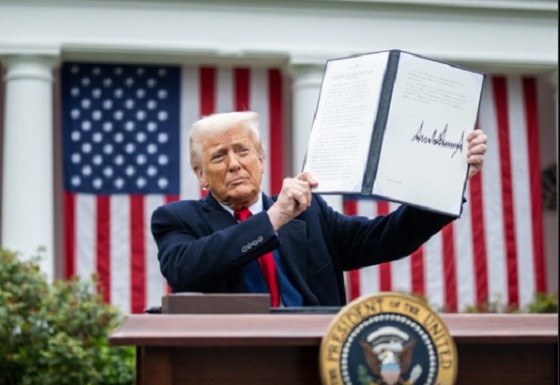
 Business1 hour ago
Business1 hour agoTrump’s long-promised “reciprocal tariff” regime is no longer a threat — it’s the new world order.
-
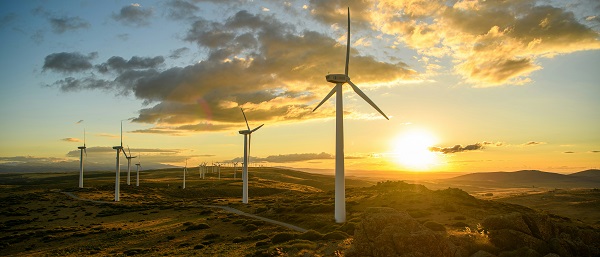
 Daily Caller2 days ago
Daily Caller2 days agoTrump Halts Preferential Treatment For ‘Unreliable, Foreign-Controlled’ Wind Energy
-
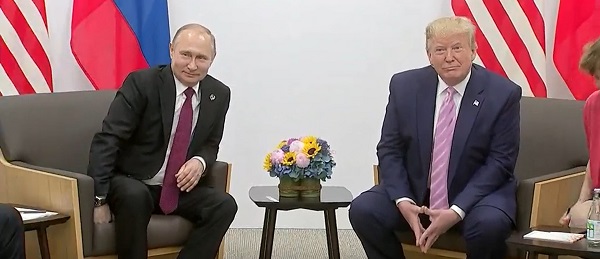
 conflict2 days ago
conflict2 days agoPutin Not Backing Down To Trump Despite Sanctions, Tariff Threats


